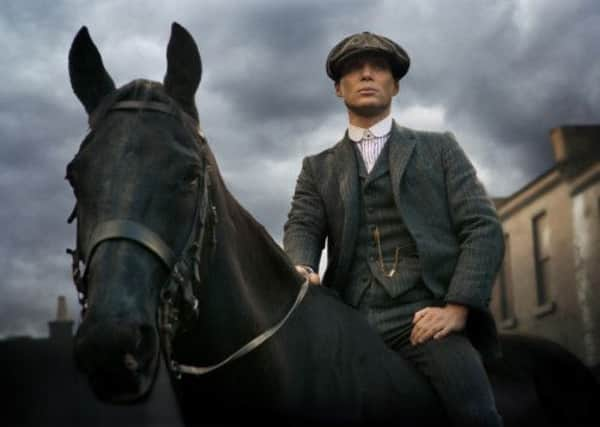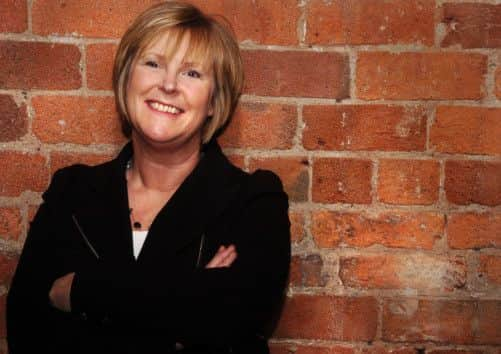Putting Yorkshire on the nation’s screens


Located off one of the main arteries running into Leeds which is also home to, among other things, a snooker club and a couple of budget hotels, Studio 81 doesn’t look like anything special.
But step inside and the labyrinth of corridors, lined with photographs of famous faces and scenes from past productions, lead you into another world. These independent studios are part of a thriving industry that has seen Yorkshire become a major draw for TV and film companies in the last few years.
Advertisement
Hide AdAdvertisement
Hide AdWhen long-running shows like Last of the Summer Wine and Heartbeat came to an end there were fears that Yorkshire’s days as a TV hotspot could be on the wane. But several high-profile productions have been filmed in Yorkshire over the past 12 months, with Leeds at the heart of this renaissance.


Next week, Peaky Blinders, an epic, six-part BBC drama starring Cillian Murphy, Sam Neill and Helen McCrory, hits our screens. Although set in the lawless streets of Birmingham in 1919, Yorkshire was one of the locations chosen and the crew spent three months filming here last autumn.
It’s not the only large-scale production filmed on our patch. The Great Train Robbery, made up of two feature-length dramas starring the likes of Jim Broadbent, Robert Glenister and Tim Pigott-Smith, is due to be screened on BBC 1 later this year. Its production offices were based at Studio 81 and a number of well- known Yorkshire locations were used for filming, including The Adelphi pub, in Leeds, Hyde Park Picture House and the Keighley and Worth Valley Railway.
Then there’s Death Comes to Pemberley – a three-part adaptation of PD James’s homage to Jane Austen starring Matthew Rhys, Anna Maxwell Martin and Matthew Goode – which used offices at the nearby Prime Studios and also took advantage of Yorkshire’s unique landscape for filming.
Advertisement
Hide AdAdvertisement
Hide AdThe county is well known for its stunning scenery and impressive stately houses, but in the highly competitive world of TV and film why are these big productions opting to head north?
Sally Joynson, chief executive of Screen Yorkshire, says the creation of the Yorkshire Content Fund, which it set up in February last year, has had a major impact. The fund is investing £7.5m from the European Regional Development Fund, matched by private sector cash, into growing TV, film, games and digital business. It’s the largest fund of its kind in the UK and is part of an ambitious plan to establish Yorkshire as a key area in the TV and film industry, not just in this country but around the world.
It appears to be working, with Peaky Blinders one of 28 major film and television drama productions that Screen Yorkshire investment has brought to the region. “Projects like Peaky Blinders, Death Comes to Pemberley and The Great Train Robbery are a direct result of the work Screen Yorkshire is doing,” says Joynson. “This fund was only launched last year and it’s already had a big impact on production companies coming to the region.”
One producer recently described Yorkshire as the “Hollywood of England,” but despite its obvious attractions – breathtaking countryside, big cities and historic buildings – Joynson says that alone isn’t enough to entice film-makers to shoot here. “The days when you can rely solely on fantastic locations are long gone, it’s about incentivising production companies to invest money in the region.
Advertisement
Hide AdAdvertisement
Hide Ad“Leeds and West Yorkshire have some absolutely fantastic locations. But the film industry is like any other business and the value isn’t just about what you see on the screen, it’s about the amount of money spent when these productions are shot here.
“It’s big business and it’s about inward investment and the returns you get, it’s about getting people into jobs and creating trainee opportunities. So it’s really significant for the city region.”
There are also some added benefits of having a thriving TV and film industry on your doorstep. “The big productions can keep rolling for many years. If you look at TV series like Last of the Summer Wine and Heartbeat they are still important in terms of generating visitor numbers to the region even after they’ve finished.”
As part of the filming for Peaky Blinders two sets were built on site at Studio 81 – an authentic-looking period pub and a replica house complete with oil lamps and stoves. Locations manager Andy Morgan, whose job it is to find the right places for filming, says Yorkshire has a lot to offer.
Advertisement
Hide AdAdvertisement
Hide Ad“It’s brilliant because it’s really diverse. I’m always stunned by the stately homes that you have here and then there’s the landscape. There are places like Bolton Abbey where we’ve done some filming and if you want to find somewhere a bit wild and remote you can do that in Yorkshire,” he says.
“We needed something that looked like an opera house so we did some filming at Leeds City Varieties, which we also used as a cinema. It was tricky to get in there from a logistical point of view being where it is, because we had to get a film crew in, but it’s such a fantastic venue.”
Peaky Blinders was the first project that received investment from Screen Yorkshire’s fund and as well as boasting an impressive cast it’s a period drama with teeth. Set shortly after the First World War, it tells the story of the Shelby family who lead the most feared and powerful local gang, the Peaky Blinders. With Communists, rival gangs and a crate of stolen guns thrown into this volatile mix, Winston Churchill dispatches a brutal Belfast policeman (played by Sam Neill) to bring order at any cost.
Steven Knight, who created the series, drew on stories told to him by his parents when he was growing up. He says “peaky blinders” was the name given to local gangsters and hoodlums in Birmingham during the 1890s. “They were characterised by sewing razor blades into the peak of their caps. But it wasn’t unique to Birmingham, all the big industrial cities had their own gangs.”
Advertisement
Hide AdAdvertisement
Hide AdHe says the war, and its aftermath, loomed large over life in Britain at the time. “My mum told me that she’d see well-dressed men walking down the street who would stop and pretend to do their shoelaces. But what they were really doing was sheltering from a shell in their head, but they couldn’t show that,” he says.
“There was a lot of austerity, people were being asked to take wage cuts and there’s a kind of resonance to times now, and inevitably people would escape through gambling, drink and music. You had this hedonistic period and it seemed this was a gift for a writer because the history of ordinary working-class people in the 1920s hasn’t really been mined for its dramatic potential.”
Cillian Murphy, star of films like Inception and The Wind That Shakes the Barley, plays Tommy Shelby who returns home from the horror of the trenches. “My character has a lack of respect for authority, he’s godless and when he’s thrown back into normal life he decides to make a name for himself and his family.”
Murphy believes TV dramas like Peaky Blinders are setting new standards. “You’re able to follow one story and come back and follow another story and you don’t get that in a feature film,” he says. “I haven’t done television in many, many years, but there’s kind of a golden age with television now and for actors to get to explore characters over the course of six hours is a real treat.”
Peaky Blinders starts on BBC Two on September 12, at 9pm.
Advertisement
Hide AdAdvertisement
Hide AdLocation, location, location: The film and TV dramas shot in Yorkshire
These are some of the film and TV dramas backed by Screen Yorkshire.
Peaky Blinders: This gangster drama was filmed at various Yorkshire locations including City Varieties, Leeds Town Hall, Keighley and Worth Valley Railway and Ilkley Winter Gardens.
The Great Train Robbery: Consisting of two feature-length dramas that were filmed at sites across Leeds city centre including The Adelphi pub, Briggate and The Calls.
Advertisement
Hide AdAdvertisement
Hide AdDeath Comes to Pemberley: This three-part drama was filmed at locations including Harewood House, York Minster and Castle Howard.
Tyrannosaur: Paddy Considine’s hard-hitting drama used locations in Seacroft, Cross Gates, Eccup, Harehills and Alwoodley as well as Wakefield.
The Damned United: Filmed at a variety of Yorkshire locations including Elland Road, Headingley Stadium and The Royal Hotel, in Scarborough.
Red Riding: TV dramatisation of three of the four books in David Peace’s Red Riding Quartet which featured several locations in Leeds including the former Yorkshire Post building, Cookridge Hospital, Armley prison and Brudenell Social Club.
Advertisement
Hide AdAdvertisement
Hide AdA Passionate Woman: Co-directed by Kay Mellor, this featured Roundhay Park, Blenheim Square, in Leeds city centre, and King’s Hall, Ilkley
Lost in Austen: This four-part drama was filmed at locations including Bramham Park and Harewood House.